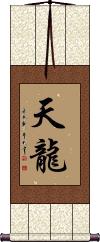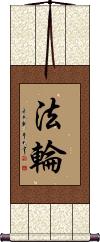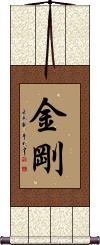Many custom options...
And formats...

The name Indra in Chinese / Japanese...
Buy an Indra calligraphy wall scroll here!
Personalize your custom “Indra” project by clicking the button next to your favorite “Indra” title below...
Indra
Indra
Celestial Dragon / Tian Long
天龍 can mean Heavenly Dragon (Dragon of Heaven), Sky Dragon, Holy Dragon, Celestial Dragon, or Divine Dragon.
This can be a given name in both China and Japan (天龍 is pronounced Tenryū and sometimes written 天竜 in Japanese).
In an older Buddhist context, this can refer to Brahma, Indra, and the devas, together with the nāgas. It can also refer to celestials and snake spirits.
Eternal Wheel of Life
法輪 is the Chinese, Japanese Kanji, and old Korean Hanja title, “The Eternal Wheel of Life,” in Buddhism.
Also known as the wheel of the law, or Buddha-truth, which can crush all evil and all opposition. It is likened to Indra's wheel, which rolls on from man-to-man, place-to-place, age-to-age.
Colloquially used in some sects to mean preaching or spreading Buddha-truth.
Adamantine / King Kong
金剛 can translate as adamantine from Chinese, Japanese, and old Korean.
Other meanings and translations can include diamond, thunderbolt, Indra's indestructible weapon, a Buddhist symbol of the indestructible truth, Vajra (a mythical weapon), guardian deity, hardness, indestructibility, power, the least frangible of minerals.
The Chinese pronunciation of “Jīn Gāng” became the loanword used in English as “King Kong.” You can see King Kong as the indestructible ape guardian deity depending on how you read the story.
Frightful Demon / Asura
This demon title comes from the ancient Sanskrit word Asura.
阿修羅 is often used in Buddhism when describing various demons. Sometimes defined as “Fighting and battling a giant demon.”
In the context of Buddhism: This title originally meant a spirit, spirits, or even the gods (perhaps before 1700 years ago). It now generally indicates titanic demons, enemies of the gods, with whom, especially Indra, they wage constant war. They are defined as “not devas,” “ugly,” and “without wine.” There are four classes of asuras, separated according to their manner of rebirth. They can be egg-born, womb-born, transformation-born, and spawn- or water-born. Their abode is in the ocean, north of Sumeru but certain of the weaker dwell in a western mountain cave. They have realms, rulers, and palaces, as have the devas.
In terms of power, Asuras rank above humans but below most other deities. They live near the coastal foot of Mount Sumeru (on the northern side). Their domain is partially or wholly in the ocean.
Not the results for Indra that you were looking for?
Below are some entries from our dictionary that may match your Indra search...
| Characters If shown, 2nd row is Simp. Chinese |
Pronunciation Romanization |
Simple Dictionary Definition |
天龍 天龙 see styles |
tiān lóng tian1 long2 t`ien lung tien lung tenryuu / tenryu てんりゅう |
More info & calligraphy: Celestial Dragon / Tian LongDevas, including Brahma, Indra, and the devas, together with the nāgas. |
法輪 法轮 see styles |
fǎ lún fa3 lun2 fa lun noriwa のりわ |
More info & calligraphy: Eternal Wheel of Life{Buddh} (See 輪宝,転法輪) the teachings of Buddha (as likened to the Dharmachakra, originally a wheel-like weapon used to destroy the evils of mankind); Buddhist doctrine; (surname) Noriwa dharmacakra, the Wheel of the Law, Buddha-truth which is able to crush all evil and all opposition, like Indra's wheel, and which rolls on from man to man, place to place, age to age. 轉法輪To turn, or roll along the Law-wheel, i.e. to preach Buddha-truth. |
金剛 金刚 see styles |
jīn gāng jin1 gang1 chin kang kongou / kongo こんごう |
More info & calligraphy: Diamond(1) vajra (indestructible substance); diamond; adamantine; (2) thunderbolt; Indra's weapon; Buddhist symbol of the indestructible truth; (p,s,g) Kongou vajra, 伐闍羅; 跋折羅 (or跋闍羅); 縛曰羅(or 縛日羅) The thunderbolt of Indra, often called the diamond club; but recent research considers it a sun symbol. The diamond, synonym of hardness, indestructibility, power, the least frangible of minerals. It is one of the saptaratna 七寶. |
因陀羅 因陀罗 see styles |
yīn tuó luó yin1 tuo2 luo2 yin t`o lo yin to lo Indara |
More info & calligraphy: IndraIndra, 因坻; 因提; 因提梨; 因達羅; 天帝; 天主帝; 帝釋天; originally a god of the atmosphere, i. e. of thunder and rain; idem Śakra; his symbol is the vajra, or thunderbolt, hence he is the 金剛手; he became 'lord of the gods of the sky', 'regent of the east quarter', 'popularly chief after Brahmā, Viṣṇu, and Śiva, '(M.W.); in Buddhism he represents the secular power, and is inferior to a Buddhist saint. Cf. 忉利 and 印. |
阿修羅 阿修罗 see styles |
ā xiū luó a1 xiu1 luo2 a hsiu lo ashura あしゅら |
More info & calligraphy: Frightful Demon / Asura{Buddh} Asura; demigod; anti-god; titan; demigods that fight the Devas (gods) in Hindu mythology; (female given name) Ashura asura, 修羅 originally meaning a spirit, spirits, or even the gods, it generally indicates titanic demons, enemies of the gods, with whom, especially Indra, they wage constant war. They are defined as 'not devas', and 'ugly', and 'without wine'. Other forms are 阿須羅 (or 阿蘇羅, or 阿素羅); 阿修倫 (or羅須倫 or 阿修輪 or 羅須輪); 阿素洛; 阿差. Four classes are named according to their manner of rebirth-egg, born, womb-born, transformation-born, and spawn- or water-born. Their abode is in the ocean, north of Sumeru, but certain of the weaker dwell in a western mountain cave. They have realms, rulers, and palaces, as have the devas. The 阿修羅道 is one of the six gatis, or ways of reincarnation. The 修羅場 or 修羅巷 is the battlefield of the asuras against Indra. The 阿修羅琴 are their harps. |
二天 see styles |
èr tiān er4 tian1 erh t`ien erh tien niten にてん |
(place-name) Niten The two devas. (1) 日天 and 月天Sun-deva and Moon-deva. (2) 同生天A deva born simultaneously with the individual and 同名天 a deva with the same name as the individual; both devas have the duty of watching over the individual. (3) 梵天 and 帝釋天 Brahma and Indra. |
供天 see styles |
gōng tiān gong1 tian1 kung t`ien kung tien kuten |
天供 The devas who serve Indra. |
修羅 修罗 see styles |
xiū luó xiu1 luo2 hsiu lo shura しゅら |
Asura, malevolent spirits in Indian mythology (1) (abbreviation) {Buddh} (See 阿修羅) Asura; demigod; anti-god; titan; demigods that fight the Devas (gods) in Hindu mythology; (2) fighting; carnage; conflict; strife; (3) sledge (for conveying large rocks, logs, etc.); (4) (See 滑道) log slide; chute; flume; (female given name) Shura asura, demons who war with Indra; v. 阿修羅; it is also sura, which means a god, or deity. |
十二 see styles |
shí èr shi2 er4 shih erh tooji とおじ |
twelve; 12 12; twelve; (given name) Tooji dvātriṃśa. Thirty-two. 三十二應 (or 三十二身) The thirty-two forms of Guanyin, and of Puxian, ranging from that of a Buddha to that of a man, a maid, a rakṣas; similar to the thirty-three forms named in the Lotus Sūtra. 三十二相三十二大人相 dvātriṃśadvaralakṣaṇa. The thirty-two lakṣaṇas, or physical marks of a cakravartī, or 'wheel-king', especially of the Buddha, i. e. level feet, thousand-spoke wheel-sign on feet, long slender fingers, pliant hands and feet, toes and fingers finely webbed, full-sized heels, arched insteps, thighs like a royal stag, hands reaching below the knees well-retracted male organ, height and stretch of arms equal, every hair-root dark coloured, body hair graceful and curly, golden-hued body, a 10 ft. halo around him, soft smooth skin, the 七處, i. e. two soles, two palms, two shoulders, and crown well rounded, below the armpits well-filled, lion-shaped body, erect, full shoulders, forty teeth, teeth white even and close, the four canine teeth pure white, lion-jawed, saliva improving the taste of all food, tongue long and broad, voice deep and resonant, eyes deep blue, eyelashes like a royal bull, a white ūrnā or curl between the eyebrows emitting light, an uṣṇīṣa or fleshy protuberance on the crown. These are from the 三藏法數 48, with which the 智度論 4, 涅盤經 28, 中阿含經, 三十ニ相經 generally agree. The 無量義經 has a different list. 三十二相經 The eleventh chapter of the 阿含經. 三十二相經願 The twenty-first of Amitābha's vows, v. 無量壽經. 三十三 trayastriṃśat. Thirty-three. 三十三天忉利天; 憺梨天, 多羅夜登陵舍; 憺利夜登陵奢; 憺利耶憺利奢 Trayastriṃśas. The Indra heaven, the second of the six heavens of form. Its capital is situated on the summit of Mt. Sumeru, where Indra rules over his thirty-two devas, who reside on thirty-two peaks of Sumeru, eight in each of the four directons. Indra's capital is called 殊勝 Sudarśana, 喜見城 Joy-view city. Its people are a yojana in height, each one's clothing weighs 六鐵 (1; 4 oz. ), and they live 1, 000 years, a day and night being equal to 100 earthly years. Eitel says Indra's heaven 'tallies in all its details with the Svarga of Brahminic mythology' and suggests that 'the whole myth may have an astronomical meaning', or be connected, with 'the atmosphere with its phenomena, which strengthens Koeppen's hypothesis explaining the number thirty-three as referring to the eight Vasus, eleven Rudras, twelve Ādityas, and two Aśvins of Vedic mythology'. In his palace called Vaijayanta 'Indra is enthroned with 1, 000 eyes with four arms grasping the vajra. There he revels in numberless sensual pleasures together with his wife Śacī... and with 119, 000 concubines with whom he associates by means of transformation'.; dvādaśa, twelve. |
四方 see styles |
sì fāng si4 fang1 ssu fang yomono よもの |
four-way; four-sided; in all directions; everywhere (1) the four cardinal directions; north, east, south and west; all directions; (2) (しほう, よほう only) surroundings; (3) (しほう only) many countries; the whole world; (4) (よも only) all around; here and there; (5) (しほう, よほう only) square; quadrilateral; four-sided figure; (6) four sides (of a square); (surname) Yomono The four quarters of the compass; a square, square; the E. is ruled by Indra, S. by Yama, W. by Varuṇa, and N. by Vaiśramaṇa; the N. E. is ruled by 伊舍尼 Iśāna, S. E. by 護摩 Homa, S. W. by 涅哩底 Nirṛti, and the N. W. by 嚩瘐 Varuṇa. |
四苑 see styles |
sì yuàn si4 yuan4 ssu yüan shion |
The pleasure grounds outside 善見城 Sudarśana, the heavenly city of Indra: E. 衆車苑 Caitrarathavana, the park of chariots; S. 麤惡苑 Parūṣakavana, the war park; W. 雜林苑 Miśrakāvana, intp. as the park where all desires are fulfilled; N. 喜林苑 Nandanavana, the park of all delights. Also 四園. |
大意 see styles |
dà yi da4 yi5 ta i masamoto まさもと |
careless synopsis; precis; summary; gist; outline; (personal name) Masamoto The general meaning or summary of a sutra or śāstra. Also, the name of a youth, a former incarnation of the Buddha : to save his nation from their poverty, he plunged into the sea to obtain a valuable pearl from the sea-god who, alarmed by the aid rendered by Indra, gave up the pearl ; v. 大意經. |
天主 see styles |
tiān zhǔ tian1 zhu3 t`ien chu tien chu tenshu てんしゅ |
God (in Catholicism); abbr. for 天主教[Tian1 zhu3 jiao4], Catholicism Lord of Heaven; God Devapati. The Lord of devas, a title of Indra. |
天供 see styles |
tiān gōng tian1 gong1 t`ien kung tien kung tenku |
celestials serving Indra |
天帝 see styles |
tiān dì tian1 di4 t`ien ti tien ti tentei / tente てんてい |
God of heaven; Celestial emperor (1) Shangdi (supreme deity in ancient Chinese religion); (2) {Christn} God; (3) {Buddh} (See 帝釈天・たいしゃくてん) Shakra (king of heaven in Hindu mythology); Indra King, or emperor of Heaven, i. e. 因陀羅 Indra, i. e. 釋 (釋迦); 釋迦婆; 帝 (帝釋); Śakra, king of the devaloka 忉利天, one of the ancient gods of India, the god of the sky who fights the demons with his vajra, or thunderbolt. He is inferior to the trimūrti, Brahma, Viṣṇu, and Śiva, having taken the place of Varuṇa, or sky. Buddhism adopted him as its defender, though, like all the gods, he is considered inferior to a Buddha or any who have attained bodhi. His wife is Indrāṇī. |
天竺 see styles |
tiān zhú tian1 zhu2 t`ien chu tien chu tenjiku てんじく |
the Indian subcontinent (esp. in Tang or Buddhist context) (1) (obsolete) India; (2) (abbreviation) (See 天竺木綿) cotton sheeting; (prefix noun) (3) foreign; imported; (prefix noun) (4) ultra-spicy; extra hot; (place-name, surname) Tenjiku (天竺國) India; 竹 zhu is said to have the same sound as 篤 tu, suggesting a connection with the 度 tu in 印度 Indu; other forms are 身毒 Sindhu, Scinde; 賢豆 Hindu; and 印持伽羅. The term is explained by 月 moon, which is the meaning of Indu, but it is said to be so called because the sages of India illumine the rest of the world: or because of the half-moon shape of the land, which was supposed to be 90, 000 li in circumference, and placed among other kingdoms like the moon among the stars. Another name is 因陀羅婆他那 ? Indravadana, or Indrabhavana, the region where Indra dwells. A hill and monastery near Hangchow. |
天衆 天众 see styles |
tiān zhòng tian1 zhong4 t`ien chung tien chung tenshu; tenju; tenshuu / tenshu; tenju; tenshu てんしゅ; てんじゅ; てんしゅう |
{Buddh} deva; celestial being The host of heaven, Brahma, Indra, and all their host. |
天鼓 see styles |
tiān gǔ tian1 gu3 t`ien ku tien ku tenko てんこ |
(given name) Tenko The deva drum— in the 善法 Good Law Hall of the Trayas-triṃśas heavens, which sounds of itself, warning the inhabitants of the thirty-three heavens that even their life is impermanent and subject to karma: at the sound of the drum Indra preaches against excess. Hence it is a title of Buddha as the great law-drum, who warns, exhorts, and encourages the good and frightens the evil and the demons. |
寶網 宝网 see styles |
bǎo wǎng bao3 wang3 pao wang hōmō |
Indra's net of gems; also 帝網; 因陀羅網. |
帝居 see styles |
dì jū di4 ju1 ti chü taiko |
The abode of Indra. |
帝弓 see styles |
dì gōng di4 gong1 ti kung tai kyū |
Indra's bow |
帝相 see styles |
dì xiàng di4 xiang4 ti hsiang Taisō |
Indra-dhvaja, a Buddha 'said to have been a contemporary of Śākyamuni, living south-west of our universe, an incarnation of the seventh son of Mahābhijñajñānabhibhū.' Eitel. |
帝網 帝网 see styles |
dì wǎng di4 wang3 ti wang taimō |
(帝釋網) ? Indra-jala. The net of Indra, hanging in Indra's 宮 hall, out of which all things can be produced; also the name of an incantation considered all-powerful. |
帝釈 see styles |
taishiyaku たいしやく |
(abbreviation) {Buddh} (See 帝釈天) Śakra (Deva); Shakra; Indra; Shakra Devanam Indra; the king of heaven in Hindu mythology; (surname) Taishiyaku |
帝釋 帝释 see styles |
dì shì di4 shi4 ti shih taishaku たいしゃく |
(surname) Taishaku Sovereign Śakra; Indra; 能天帝 mighty lord of devas; Lord of the Trayastriṃśas, i.e. the thirty-three heavens 三十三天 q. v.; he is also styled 釋迦提桓因陀羅 (or 釋迦提婆因陀羅) (or 釋迦提桓因達羅 or 釋迦提婆因達羅); 釋帝桓因 Śakra-devānām Indra. |
桓因 see styles |
huán yīn huan2 yin1 huan yin Kanin |
Indra, abbrev. for 釋提桓因. |
殊勝 殊胜 see styles |
shū shèng shu1 sheng4 shu sheng shushou / shusho しゅしょう |
(noun or adjectival noun) admirable; laudable Rare, extraordinary, surpassing, as the 殊勝殿 and 池 surpassing palace and lake of Indra. |
焰網 焰网 see styles |
yàn wǎng yan4 wang3 yen wang enmō |
The flaming, or shining net of Buddha, the glory of Buddha, which encloses everything like the net of Indra. |
美音 see styles |
měi yīn mei3 yin1 mei yin riri りり |
a sweet voice; (female given name) Riri Beautiful sound, a king of the Gandharvas (乾闥婆), Indra's musicians. Also, the name of a son of Sudhīra and Sumitra converted by Ānanda. |
舍支 see styles |
shè zhī she4 zhi1 she chih shashi |
śaśa, 設施 a hare; śaśī, or śaśin, the moon; śakti, energy. (1) The hare (which threw itself into the fire to save starving people), transferred by Indra to the centre of the moon. (2) śakti is the wife or female energy of a deity, cf. 舍脂. (3) The female organ. |
Click here for more Indra results from our dictionary
The following table may be helpful for those studying Chinese or Japanese...
| Title | Characters | Romaji (Romanized Japanese) | Various forms of Romanized Chinese | |
| Indra | 因陀羅 因陀罗 | yīn tuó luó yin1 tuo2 luo2 yin tuo luo yintuoluo | yin t`o lo yintolo yin to lo |
|
| Indra | インドラ | indora | ||
| Celestial Dragon Tian Long | 天龍 天龙 | tenryuu / tenryu | tiān lóng tian1 long2 tian long tianlong | t`ien lung tienlung tien lung |
| Eternal Wheel of Life | 法輪 法轮 | hourin / horin horin / horin | fǎ lún / fa3 lun2 / fa lun / falun | |
| Adamantine King Kong | 金剛 金刚 | kongou / kongo | jīn gāng / jin1 gang1 / jin gang / jingang | chin kang / chinkang |
| Frightful Demon Asura | 阿修羅 阿修罗 | ashura | ē xiū luó e1 xiu1 luo2 e xiu luo exiuluo | o hsiu lo ohsiulo |
| In some entries above you will see that characters have different versions above and below a line. In these cases, the characters above the line are Traditional Chinese, while the ones below are Simplified Chinese. | ||||
Successful Chinese Character and Japanese Kanji calligraphy searches within the last few hours...









